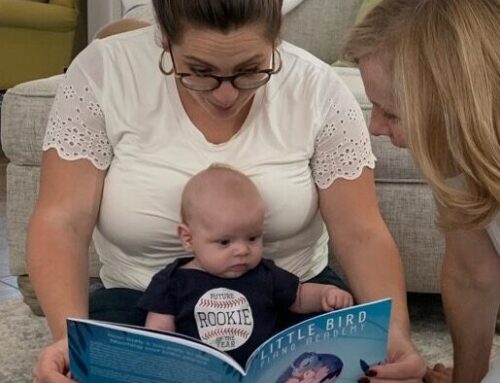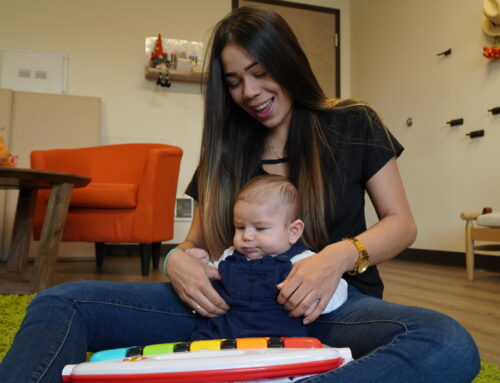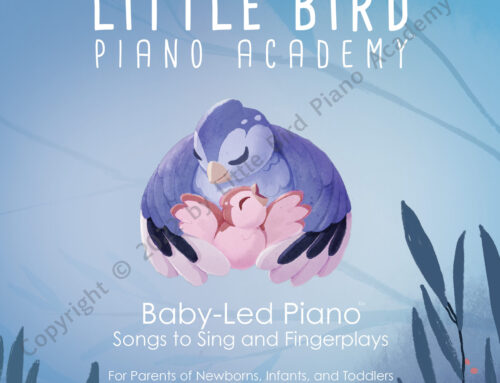‘ve known so many musicians in my life who are anxious, worried, and who just don’t really have fun.
They love music, because, well, music. But they too often have a kind of love/hate relationship with practicing. Because while they want to be good at their instrument, there’s always that fight between wanting to improve and the inner voice telling them they’ll never be good enough.
I believe music making should be fun, carefree, and something we do every single day. I believe everyone can enjoy making music, and can improve over time when they have so much fun that they want to spend time every day learning and improving. Not because they want to eliminate mistakes, but because they love the way the music sounds as they keep practicing, and because they feel safe and warm playing and singing with the people they love the most.
I want to share some great ways you can help your child to have a love/love relationship with music, and with you!
- Check the things you say about yourself – are you critical of yourself around your baby?
- Make sure the message you’re giving your baby by the things you say, is that you believe in them.
- Try to show by your actions that you believe in yourself, and in your child.
You know that voice inside your head?
The one that’s always telling you things about yourself?
Sometimes people call that your “inner critic”. This is the voice that we started to develop from the day we were born, before we even had words. We may be able to explain them with words now, but they started out as impressions and feelings.
If you have words swimming around in your head like, “I can do this!” “I’m friendly” or “I’m really good at art” your actions are going to reflect those ideas.
For example, if you’re thinking “I’m friendly”, you might be more inclined to reach out to people, not to worry whether they like you, and to make friends. If your inner voice tells you “I’m such a weirdo,” your actions will reflect that idea. You might be less likely to look people in the eye, to talk to them, and consequently end up with fewer friends.
It might seem like we think things like this because they’re already true. But researchers are finding that these ideas get formed before they have a chance to be true or false, and that our amazing brains work very hard to make them be the case. It can be difficult to recognize our inner critic, because it’s always been there, telling us things about ourselves, and they naturally seem to be true. It can be freeing to start to notice the things we’re telling ourselves, and to start to re-write our story, but it can be a long process.
All that being said, did you know that your baby is forming their inner voice right now? Before your baby has a chance to decide how they want to be in life, they’re forming impressions about themselves that will shape their lives. Your baby’s inner voice can come from the things you say about yourself, the things you say directly to them, and the things you imply by your actions.
 I want to invite you to check yourself when your inner critic becomes verbal. Listen to the kinds of things you say out loud about yourself. If you wouldn’t say those things to your baby, try not to say them to yourself either. Your baby’s opinion of themselves will often mirror your image of yourself. Did you know that your baby, the fastest learner on the planet, is picking up cues about themselves from the things they hear you say? Their inner voice will start to say the same things. Don’t be discouraged if your inner critic is taking the mic. I think it happens to everyone. The good news is, you can re-write your story by telling yourself new things. Things that you want to become true. It’s not some kind of magic or hocus pocus. It’s just cause and effect.
I want to invite you to check yourself when your inner critic becomes verbal. Listen to the kinds of things you say out loud about yourself. If you wouldn’t say those things to your baby, try not to say them to yourself either. Your baby’s opinion of themselves will often mirror your image of yourself. Did you know that your baby, the fastest learner on the planet, is picking up cues about themselves from the things they hear you say? Their inner voice will start to say the same things. Don’t be discouraged if your inner critic is taking the mic. I think it happens to everyone. The good news is, you can re-write your story by telling yourself new things. Things that you want to become true. It’s not some kind of magic or hocus pocus. It’s just cause and effect.
The even better news is, you can help your baby to have a more positive inner voice by saying things out loud to them like “I love spending time with you” or “I love how hard you work.” or “You are kind.”
Your actions will help your baby to develop a healthy inner voice as you take extra time to listen to your baby, and to spend time playing with them every day.
There are even more ways you can help your growing child to develop a positive inner voice and to grow up feeling good about their lives and accomplishing big things. As you become really aware of the messages you’re giving your baby now, and as they grow older, pay attention to what you’re telling them.
It might be your goal to help your child to be focused and to work hard. These are good things that we all want for our kids so they can do well in school and have good jobs. But the messages parents sometimes give their kids in the effort to help them, can turn on our kids. If we’re constantly telling them, “Pay attention,” the message in our child’s mind might be forming that “I’m not good at paying attention.” Especially if it comes out of our mouths more strongly like “You never focus” or “How many times have I told you to stop doing XY or Z?” Our kids are so good at learning, that these can become the predominant thoughts they develop about themselves: “I never focus” or “I always XY or Z”. Even if our messages come less overtly. Things like “I’m too busy, I can’t play with you,” or simply actions like walking away while they’re telling us something or minimizing their feelings. The messages in our kids’ brains can sometimes be exaggerated because we’re their main point of reference.
When it comes to teaching our kids music, the same things are true. As our kids watch us making music (or not making music) they’ll form opinions about whether that’s something they want to do. As they hear us react to mistakes, it’ll be super important what we say. Even if you feel self-conscious about making a lot of mistakes, it’s important to your child that you try to reframe your position on this. Instead of saying things like “I’ll never get that right” or “I’m so bad at this,” try focusing on the experience you want it to be for your little human sponge. Try saying things like “Oops, that wasn’t what I meant – let me try that again.” and even NOT saying anything about mistakes. Try to normalize mistakes. I know that might sound counterintuitive if you’ve spent a lifetime focusing on mistakes, but focusing on the fun instead of the mistakes is so much more effective for learning to play!
It’s important to make sure the things we’re telling our kids with our words are “you’re having so much fun” “I love spending time with you” and “I love to make music!” Try to focus more on the time together, the fun you’re having spending time with them, and the things they have control over like “you’re so good at practicing” or “I love how you take the time to be with me”.
Your baby’s inner voice might be forming to say things like “I am so lovable” as you take extra efforts to tell them so with your words, and with your actions.
Parents can help their kids to have a positive experience around music, and in other parts of life – perhaps more positive than our own, by being aware of the inner voice, and the one that sneaks out of our mouths from time to time.







